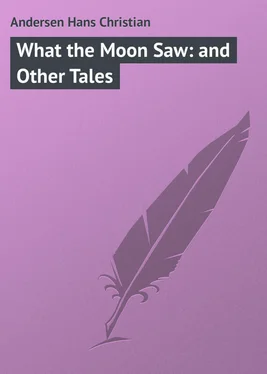Andersen Hans - What the Moon Saw - and Other Tales
Здесь есть возможность читать онлайн «Andersen Hans - What the Moon Saw - and Other Tales» — ознакомительный отрывок электронной книги совершенно бесплатно, а после прочтения отрывка купить полную версию. В некоторых случаях можно слушать аудио, скачать через торрент в формате fb2 и присутствует краткое содержание. Жанр: foreign_prose, на английском языке. Описание произведения, (предисловие) а так же отзывы посетителей доступны на портале библиотеки ЛибКат.
- Название:What the Moon Saw: and Other Tales
- Автор:
- Жанр:
- Год:неизвестен
- ISBN:нет данных
- Рейтинг книги:5 / 5. Голосов: 1
-
Избранное:Добавить в избранное
- Отзывы:
-
Ваша оценка:
- 100
- 1
- 2
- 3
- 4
- 5
What the Moon Saw: and Other Tales: краткое содержание, описание и аннотация
Предлагаем к чтению аннотацию, описание, краткое содержание или предисловие (зависит от того, что написал сам автор книги «What the Moon Saw: and Other Tales»). Если вы не нашли необходимую информацию о книге — напишите в комментариях, мы постараемся отыскать её.
What the Moon Saw: and Other Tales — читать онлайн ознакомительный отрывок
Ниже представлен текст книги, разбитый по страницам. Система сохранения места последней прочитанной страницы, позволяет с удобством читать онлайн бесплатно книгу «What the Moon Saw: and Other Tales», без необходимости каждый раз заново искать на чём Вы остановились. Поставьте закладку, и сможете в любой момент перейти на страницу, на которой закончили чтение.
Интервал:
Закладка:
Twenty-eighth Evening
"I will give you another picture of Sweden," said the Moon. "Among dark pine woods, near the melancholy banks of the Stoxen, lies the old convent church of Wreta. My rays glided through the grating into the roomy vaults, where kings sleep tranquilly in great stone coffins. On the wall, above the grave of each, is placed the emblem of earthly grandeur, a kingly crown; but it is made only of wood, painted and gilt, and is hung on a wooden peg driven into the wall. The worms have gnawed the gilded wood, the spider has spun her web from the crown down to the sand, like a mourning banner, frail and transient as the grief of mortals. How quietly they sleep! I can remember them quite plainly. I still see the bold smile on their lips, that so strongly and plainly expressed joy or grief. When the steamboat winds along like a magic snail over the lakes, a stranger often comes to the church, and visits the burial vault; he asks the names of the kings, and they have a dead and forgotten sound. He glances with a smile at the worm-eaten crowns, and if he happens to be a pious, thoughtful man, something of melancholy mingles with the smile. Slumber on, ye dead ones! The Moon thinks of you, the Moon at night sends down his rays into your silent kingdom, over which hangs the crown of pine wood."
Twenty-ninth Evening
"Close by the high-road," said the Moon, "is an inn, and opposite to it is a great waggon-shed, whose straw roof was just being re-thatched. I looked down between the bare rafters and through the open loft into the comfortless space below. The turkey-cock slept on the beam, and the saddle rested in the empty crib. In the middle of the shed stood a travelling carriage; the proprietor was inside, fast asleep, while the horses were being watered. The coachman stretched himself, though I am very sure that he had been most comfortably asleep half the last stage. The door of the servants' room stood open, and the bed looked as if it had been turned over and over; the candle stood on the floor, and had burnt deep down into the socket. The wind blew cold through the shed: it was nearer to the dawn than to midnight. In the wooden frame on the ground slept a wandering family of musicians. The father and mother seemed to be dreaming of the burning liquor that remained in the bottle. The little pale daughter was dreaming too, for her eyes were wet with tears. The harp stood at their heads, and the dog lay stretched at their feet."
Thirtieth Evening
"It was in a little provincial town," the Moon said; "it certainly happened last year, but that has nothing to do with the matter. I saw it quite plainly. To-day I read about it in the papers, but there it was not half so clearly expressed. In the taproom of the little inn sat the bear leader, eating his supper; the bear was tied up outside, behind the wood pile – poor Bruin, who did nobody any harm, though he looked grim enough. Up in the garret three little children were playing by the light of my beams; the eldest was perhaps six years old, the youngest certainly not more than two. 'Tramp, tramp' – somebody was coming upstairs: who might it be? The door was thrust open – it was Bruin, the great, shaggy Bruin! He had got tired of waiting down in the courtyard, and had found his way to the stairs. I saw it all," said the Moon. "The children were very much frightened at first at the great shaggy animal; each of them crept into a corner, but he found them all out, and smelt at them, but did them no harm. 'This must be a great dog,' they said, and began to stroke him. He lay down upon the ground, the youngest boy clambered on his back, and bending down a little head of golden curls, played at hiding in the beast's shaggy skin. Presently the eldest boy took his drum, and beat upon it till it rattled again; the bear rose upon his hind legs, and began to dance. It was a charming sight to behold. Each boy now took his gun, and the bear was obliged to have one too, and he held it up quite properly. Here was a capital playmate they had found; and they began marching – one, two; one, two.
"Suddenly some one came to the door, which opened, and the mother of the children appeared. You should have seen her in her dumb terror, with her face as white as chalk, her mouth half open, and her eyes fixed in a horrified stare. But the youngest boy nodded to her in great glee, and called out in his infantile prattle, 'We're playing at soldiers.' And then the bear leader came running up."
Thirty-first Evening
The wind blew stormy and cold, the clouds flew hurriedly past; only for a moment now and then did the Moon become visible. He said, "I looked down from the silent sky upon the driving clouds, and saw the great shadows chasing each other across the earth. I looked upon a prison. A closed carriage stood before it; a prisoner was to be carried away. My rays pierced through the grated window towards the wall: the prisoner was scratching a few lines upon it, as a parting token; but he did not write words, but a melody, the outpouring of his heart. The door was opened, and he was led forth, and fixed his eyes upon my round disc. Clouds passed between us, as if he were not to see my face, nor I his. He stepped into the carriage, the door was closed, the whip cracked, and the horses galloped off into the thick forest, whither my rays were not able to follow him; but as I glanced through the grated window, my rays glided over the notes, his last farewell engraved on the prison wall – where words fail, sounds can often speak. My rays could only light up isolated notes, so the greater part of what was written there will ever remain dark to me. Was it the death-hymn he wrote there? Were these the glad notes of joy? Did he drive away to meet death, or hasten to the embraces of his beloved? The rays of the Moon do not read all that is written by mortals."
Thirty-second Evening
"I love the children," said the Moon, "especially the quite little ones – they are so droll. Sometimes I peep into the room, between the curtain and the window frame, when they are not thinking of me. It gives me pleasure to see them dressing and undressing. First, the little round naked shoulder comes creeping out of the frock, then the arm; or I see how the stocking is drawn off, and a plump little white leg makes its appearance, and a white little foot that is fit to be kissed, and I kiss it too.
"But about what I was going to tell you. This evening I looked through a window, before which no curtain was drawn, for nobody lives opposite. I saw a whole troop of little ones, all of one family, and among them was a little sister. She is only four years old, but can say her prayers as well as any of the rest. The mother sits by her bed every evening, and hears her say her prayers; and then she has a kiss, and the mother sits by the bed till the little one has gone to sleep, which generally happens as soon as ever she can close her eyes.
"This evening the two elder children were a little boisterous. One of them hopped about on one leg in his long white nightgown, and the other stood on a chair surrounded by the clothes of all the children, and declared he was acting Grecian statues. The third and fourth laid the clean linen carefully in the box, for that is a thing that has to be done; and the mother sat by the bed of the youngest, and announced to all the rest that they were to be quiet, for little sister was going to say her prayers.
"I looked in, over the lamp, into the little maiden's bed, where she lay under the neat white coverlet, her hands folded demurely and her little face quite grave and serious. She was praying the Lord's prayer aloud. But her mother interrupted her in the middle of her prayer. 'How is it,' she asked, 'that when you have prayed for daily bread, you always add something I cannot understand? You must tell me what that is.' The little one lay silent, and looked at her mother in embarrassment. 'What is it you say after our daily bread ?' 'Dear mother, don't be angry: I only said, and plenty of butter on it .'"
Читать дальшеИнтервал:
Закладка:
Похожие книги на «What the Moon Saw: and Other Tales»
Представляем Вашему вниманию похожие книги на «What the Moon Saw: and Other Tales» списком для выбора. Мы отобрали схожую по названию и смыслу литературу в надежде предоставить читателям больше вариантов отыскать новые, интересные, ещё непрочитанные произведения.
Обсуждение, отзывы о книге «What the Moon Saw: and Other Tales» и просто собственные мнения читателей. Оставьте ваши комментарии, напишите, что Вы думаете о произведении, его смысле или главных героях. Укажите что конкретно понравилось, а что нет, и почему Вы так считаете.












